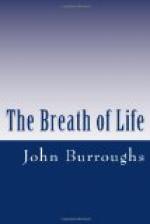One wishes Professor Henderson had told us more about how life fits itself to the environment—how matter, moved and moulded only by mechanical and chemical forces, yet has some power of choice that a machine does not have, and can and does select the environment best suited to its well-being. In fact, that it should have, or be capable of, any condition of well-being, if it is only a complex of physical and chemical forces, is a problem to wrestle with. The ground we walk on is such a complex, but only the living bodies it supports have conditions of well-being.
Professor Henderson concedes very little to the vitalists or the teleologists. He is a thorough mechanist. “Matter and energy,” he says, “have an original property, assuredly not by chance, which organizes the universe in space and time.” Where or how matter got this organizing property, he offers no opinion. “Given the universe, life, and the tendency [the tendency to organize], mechanism is inductively proved sufficient to account for all phenomena.” Biology, then, is only mechanics and chemistry engaged in a new role without any change of character; but what put them up to this new role? “The whole evolutionary process, both cosmic and organic, is one, and the biologist may now rightly regard the universe in its very essence as biocentric.”
V
Another Harvard voice is less pronounced in favor of the mechanistic conception of life. Professor Rand thinks that in a mechanically determined universe, “our conscious life becomes a meaningless replica of an inexorable physical concatenation”—the soul the result of a fortuitous concourse of atoms. Hence all the science and art and literature and religion of the world are merely the result of a molecular accident.




